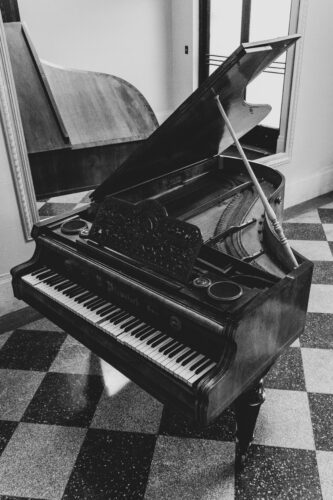
#1 Leave Key Lid Open
Sometimes Keeping your piano’s key lid closed when not in use is a good habit to have … 70% of the time. Dust and air particles can build up into a sticky mess between piano keys, causing mobility issues. However, if the lid remains closed for too long, mold growth can occur inside the piano. This is especially true if your piano is kept in a dark or humid room. Keep the key lid up a couple times each week during daylight hours. Indirect sunlight and proper air circulation will discourage mold growth inside your piano. If you have a keyboard, invest in a properly fitted cover. Mold is generally not an issue here. A gentle once-over with a vacuum cleaner attachment can help fight off dust buildup.
#2 No Drinks at the Piano!
If liquid seeps between the piano keys and reaches the interior, it can cause major (and costly) damage. The chance for doing harm the exterior wood’s finish is a given. If liquid gets onto the piano keyboard, wipe up excess liquid from the keys’ surface. To avoid further dripping, try not to press any keys while doing this. If liquid gets between the keys, contact a registered piano technician as soon as possible. Do not attempt to remove the keys and fix the mess yourself. For spills on electric keyboards: Unplug at once. Do not attempt to shake your keyboard dry; this can drive liquid deeper into your instrument. Wait a few days for it to dry before testing it out, and start reading some keyboard reviews, just in case.
# 3 Ideal Humidity Levels for a Piano
Pianos are very sensitive to fluctuations in humidity. High humidity levels can cause wood to warp; and lower humidity can cause cracking. Your piano’s wood was intricately positioned and crafted, and the sound quality relies on it. Changes in the wood can also affect tuning; if the wood loosens or tenses up, the strings will follow suit and go out of tune. Monitor your indoor humidity levels, and regulate them with a humidifier or dehumidifier. 40% humidity is ideal. Keep the piano away from heater vents and windows, and close the door of your piano room if it is near a kitchen or bathroom. Close any windows in your piano room to prevent condensation. This is especially important for your electric piano.
#4 Regulate the Climate Around a Piano
Temperature can be another enemy of the piano. The cold can weaken delicate wooden parts, and using a piano in this condition can cause these parts to snap. Heat can negatively affect the strings, and can loosen the felt on the hammers. Room temperature (70-72° F, 21-22° C) is ideal.
Keep your piano away from an exterior wall. If no other space is available, position the piano, at least, two feet away from it. Regulate the room’s temperature with an air conditioner or heater, but keep the piano at a distance from both. Close all doors and windows of your piano room, and never allow direct sunlight to touch your instrument. It can damage the interior, and cause discoloration and cracking of the piano’s finish.